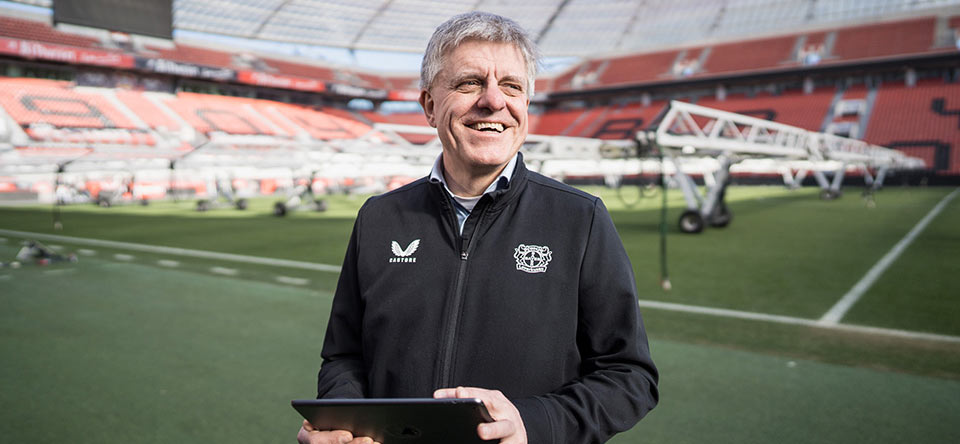Bayer Leverkusen – IT for football fans and players.
What role does IT play at a German football club? Andreas Hinder, Head of IT at Bayer 04 Leverkusen, tells us what it’s like at the club. It’s clear that IT plays a huge role in many ways—from the fan experience and central systems like the merch shop and ticketing to sport technologies used by and around the players of the reigning German champions.
Written by
E-Mail: stefan.maurer@bechtle.com

You’ve been with Bayer 04 for 15 years now, how have things changed in that time?
The day-to-day has changed a lot because IT 15 years ago was far less reliable than it is today. That means we have less operative pressure, but are juggling more complex topics instead, and there has been a significant increase in investments, too.
Which aspects of IT are Bayer investing in?
Quite a few. The fan experience is a big one. For starters, we’re trialling an AI chatbot to filter the many inquiries we receive and notify staff if they need to reply. This is particularly useful on match days. We want fans to benefit from digital support from the moment they leave their home until the end of the game, with good connectivity in the stadium so they can stay online while, first and foremost, having a good time. This means that we are working on integrating our systems better—access, PoS, cameras... they should all work together.
And there’s more?
Yes, like many other SMEs, we always have one eye on cybersecurity as our success in the league has led to more attacks. We’re training employees, investing in firewalls, segmenting, incident response, and simulating successful attacks.
And how about sport technology itself?
That’s another key area that’s seeing a lot of action at the moment. We are the team behind the team behind the team and are here to ensure that everyone at Bayer can do their job no holds barred. That includes post-match analyses and talent scouting, which generate huge amounts of data that we need to host, but we also need to develop our own software and then link up existing tools with it. Using AI will also play a role in future. Ultimately, it’s like a business intelligence system—we try to offer an ideal data basis for the decisions that have to be made. It will never replace people and I don’t want to try and predict if and perhaps to what extent this will contribute to successes on the field.
So there are three main target groups. Fans, admin and ticketing staff as well as those in other central functions, and the people directly involved with the team.
We provide our colleagues in all departments with a wide range of IT services to help them do a good job.
Like many other SMEs, we always have one eye on cybersecurity as our success in the league has naturally led to more attacks.
Andreas Hinder
Bechtle and Bayer 04 Leverkusen have enjoyed a trust-based partnership since 2015. Numerous projects have been implemented together, including the installation of a telephone system, a backup project, the M365 migration, device management, a predefined shopping basket for clients that includes lifecycle management, the introduction of an intranet based on SharePoint, IT security support and two complete redesigns of the Bayer 04 data centre.
How big is your team?
Not very, we’re just 18 people specialising in different areas. We all listen to each others’ needs and try to find the best solution. The aim is to consolidate projects and operations under one person or team to boost accountability and reliability. The typical application areas are supported by three shared service teams, who first focus on supplying employees with notebooks, smartphones, tablets, and phones, then infrastructure and platform operations in the cloud and on-premise and, more recently, software development.
Which of these is the most pressing?
All of them (laughs). For me, the tools our fans use are incredibly important. As our success has grown, the demands on our internal processes have too, meaning we have to do more in less time and we can never drop the ball. AI will open the door to a lot of new opportunities for us in the coming years and I believe that IoT will also become even more important in the future in many ways. We want to consolidate all of the technology used in the stadium, but it’s not an easy task, especially in this sort of environment. Stadia operate various systems, some of them only used in this or in event settings. They are niche products that often don’t have the necessary interfaces and which are based on different systems. Integrating them isn’t always easy, but it’s crucial for us and our stadium’s ever more complex IT landscape.
Do you have an overarching strategy?
Of course, and it’s something that’s always being updated. There’s one point from it that’s helped us a lot in recent years and that’s we strive for zero glitches. Now that doesn’t just sound utopian, it really is, but this is what drives us. We’ve invested a lot in the reliability of our systems and work with a multitude of checklists before match days—with great results. Of course, sometimes a PoS system or card reader stop working, but then we leap into action. That’s why we keep projects and operations together. We obviously have service providers that help us, but a lot of our work is at weekends and at night and to keep everything on track, we have to do a lot ourselves. This is key and definitely part of our success story.
